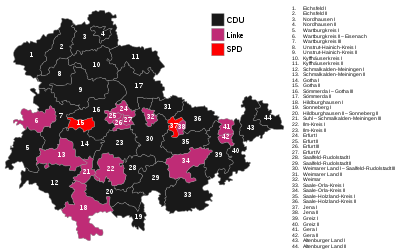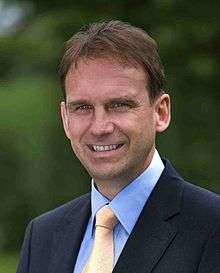2009 Thuringian state election
The 2009 Thuringian state election was held on 30 August 2009 to elect the members of the 5th Landtag of Thuringia. It was held on the same day as the 2009 Saarland state election and the 2009 Saxony state election. The incumbent Christian Democratic Union (CDU) government led by Minister-President Dieter Althaus was defeated. The CDU subsequently formed a grand coalition with the Social Democratic Party (SPD). Althaus resigned after the election due to his party's poor performance, which was far below expectations. He was succeeded by fellow CDU member Christine Lieberknecht, who was elected as the new Minister-President.[1]
| |||||||||||||||||||||||||||||||||||||||||||||||||||||||||||||||||||||||||||
All 88 seats of the Landtag of Thuringia | |||||||||||||||||||||||||||||||||||||||||||||||||||||||||||||||||||||||||||
|---|---|---|---|---|---|---|---|---|---|---|---|---|---|---|---|---|---|---|---|---|---|---|---|---|---|---|---|---|---|---|---|---|---|---|---|---|---|---|---|---|---|---|---|---|---|---|---|---|---|---|---|---|---|---|---|---|---|---|---|---|---|---|---|---|---|---|---|---|---|---|---|---|---|---|---|
| Registered | 1,910,074 | ||||||||||||||||||||||||||||||||||||||||||||||||||||||||||||||||||||||||||
| Turnout | 1,054,297 (56.2%) | ||||||||||||||||||||||||||||||||||||||||||||||||||||||||||||||||||||||||||
| |||||||||||||||||||||||||||||||||||||||||||||||||||||||||||||||||||||||||||
 Results for the direct mandates. | |||||||||||||||||||||||||||||||||||||||||||||||||||||||||||||||||||||||||||
| |||||||||||||||||||||||||||||||||||||||||||||||||||||||||||||||||||||||||||
Parties
The table below lists parties represented in the 4th Landtag of Thuringia.
| Name | Ideology | Leader(s) | 2004 result | |||
|---|---|---|---|---|---|---|
| Votes (%) | Seats | |||||
| CDU | Christian Democratic Union of Germany Christlich Demokratische Union Deutschlands |
Christian democracy | Dieter Althaus | 43.0% | 45 / 88 | |
| Linke | The Left Die Linke |
Democratic socialism | Bodo Ramelow | 26.1%[lower-alpha 4] | 28 / 88 | |
| SPD | Social Democratic Party of Germany Sozialdemokratische Partei Deutschlands |
Social democracy | Christoph Matschie | 14.5% | 15 / 88 | |
Opinion polling
| Polling firm | Fieldwork date | Sample size |
CDU | Linke | SPD | Grüne | FDP | Others | Lead |
|---|---|---|---|---|---|---|---|---|---|
| 2009 state election | 30 August 2009 | – | 31.2 | 27.4 | 18.5 | 6.2 | 7.6 | 9.1 | 3.8 |
| TU Ilumenau | 10–22 Aug 2009 | 369 | 41 | 23 | 15 | 10 | 8 | 3 | 18 |
| Forschungsgruppe Wahlen | 17–20 Aug 2009 | ~1,000 | 35 | 25 | 18 | 5 | 10 | 7 | 10 |
| Infratest dimap | 18–20 Aug 2009 | 1,000 | 34 | 24 | 19 | 6 | 8 | 9 | 10 |
| IfM Leipzig | 10–13 Aug 2009 | 805 | 37 | 23 | 20 | 5 | 9 | 6 | 14 |
| Infratest dimap | 7–11 Aug 2009 | 1,000 | 34 | 24 | 20 | 6 | 9 | 7 | 10 |
| Forsa | 13–24 Jul 2009 | 1,004 | 40 | 24 | 16 | 6 | 6 | 8 | 16 |
| Infratest dimap | 19–23 Jun 2009 | 1,000 | 36 | 24 | 18 | 6 | 9 | 7 | 12 |
| IfM Leipzig | 11–13 May 2009 | 801 | 36 | 23 | 23 | 5 | 8 | 5 | 13 |
| Forsa | 4–15 May 2009 | 1,005 | 40 | 26 | 18 | 4 | 6 | 6 | 14 |
| Infratest dimap | 8–12 May 2009 | 1,000 | 39 | 25 | 20 | 5 | 6 | 5 | 14 |
| Infratest dimap | 18–22 Mar 2009 | 1,000 | 36 | 25 | 20 | 5 | 8 | 6 | 11 |
| GESS | 4–7 Mar 2009 | 1,004 | 39 | 25 | 18 | 4 | 8 | 6 | 14 |
| Forsa | 12–16 Jan 2009 | 751 | 39 | 28 | 16 | 5 | 5 | 7 | 11 |
| IfM Leipzig | 21–23 Oct 2008 | 805 | 33 | 30 | 18 | 5 | 6 | 7 | 3 |
| Forsa | 25 Aug–9 Sep 2008 | 863 | 37 | 32 | 15 | 4 | 5 | 7 | 5 |
| dimap | 26 Jun–10 Jul 2008 | 1,001 | 31 | 31 | 20 | 5 | 6 | 7 | Tie |
| Infratest dimap | 5–7 May 2008 | 1,000 | 33 | 29 | 23 | 5 | 5 | 5 | 4 |
| IfM Leipzig | 8–10 Apr 2008 | 804 | 33 | 29 | 21 | 6 | 5 | 6 | 4 |
| Emnid | 13–27 Feb 2008 | ~500 | 36 | 25 | 24 | 4 | 5 | ? | 11 |
| IfM Leipzig | 10–12 Dec 2007 | 803 | 35 | 25 | 25 | 5 | 4 | 6 | 10 |
| Infratest dimap | October 2007 | 1,000 | 35 | 26 | 23 | 5 | 5 | ? | 9 |
| IfM Leipzig | 21–22 Aug 2007 | 801 | 36 | 29 | 25 | 3 | 3 | 4 | 7 |
| dimap | 9–13 Jul 2007 | 1,003 | 40 | 25 | 24 | 4 | 4 | 3 | 15 |
| IfM Leipzig | 12–15 May 2007 | 801 | 34 | 25 | 26 | 5 | 5 | 5 | 8 |
| Emnid | 30 Apr–16 May 2007 | 516 | 32 | 27 | 22 | 6 | 6 | 6 | 5 |
| IfM Leipzig | 23 Feb 2007 | ? | 30 | 26 | 28 | 6 | 5 | 5 | 2 |
| IfM Leipzig | 15 Dec 2006 | 802 | 34 | 25 | 27 | 5 | 4 | 5 | 7 |
| IfM Leipzig | 16–17 Aug 2006 | 810 | 33 | 26 | 30 | 4 | 3 | 4 | 3 |
| IfM Leipzig | 7–8 Feb 2006 | 802 | 34 | 24 | 29 | 3 | 4 | 6 | 10 |
| IfM Leipzig | 12–15 Dec 2005 | 806 | 36 | 26 | 27 | 3 | 5 | 3 | 9 |
| Uni Jena | July 2005 | ~1,000 | 40 | 31 | 15 | 4 | 5 | 5 | 9 |
| IfM Leipzig | 28–30 May 2005 | 803 | 45 | 21 | 20 | 4 | 5 | 5 | 24 |
| IfM Leipzig | 24 Jan 2005 | 806 | 39 | 22 | 23 | 4 | 4 | 8 | 16 |
| IfM Leipzig | September 2004 | ? | 41 | 25 | 18 | 6 | 4 | 6 | 16 |
| 2004 state election | 13 June 2004 | – | 43.0 | 26.1 | 14.5 | 4.5 | 3.6 | 8.3 | 16.9 |
Election result
Summary of the 30 August 2009 election results for the Landtag of Thuringia
| Party | Votes | % | +/- | Seats | +/- | Seats % | |
|---|---|---|---|---|---|---|---|
| Christian Democratic Union (CDU) | 329,302 | 31.2 | 30 | 34.1 | |||
| The Left (Linke) | 288,915 | 27.4 | 28 | 30.7 | |||
| Social Democratic Party (SPD) | 195,363 | 18.5 | 18 | 20.5 | |||
| Free Democratic Party (FDP) | 80,600 | 7.6 | 7 | 8.0 | |||
| Alliance 90/The Greens (Grüne) | 64,912 | 6.2 | 6 | 6.8 | |||
| National Democratic Party (NPD) | 45,451 | 4.3 | 0 | ±0 | 0 | ||
| Free Voters (FW) | 40,811 | 3.9 | 0 | ±0 | 0 | ||
| Others | 8,943 | 0.8 | 0 | ±0 | 0 | ||
| Total | 1,054,297 | 100.0 | 88 | ±0 | |||
| Voter turnout | 56.2 | ||||||
Outcome
Minister-President and CDU leader Dieter Althaus resigned in the wake of the election, stating he took responsibility for his party's losses.[2] However, observers noted that his resignation also helped clear the way for a grand coalition between the CDU and SPD, which was preferred by both parties, and would be easier to manage under new leadership. The only viable alternative to a grand coalition was a government led by The Left with SPD and Green support, which both the CDU and SPD sought to avoid; the CDU because such a coalition would leave them in opposition, and the SPD because of personal animosity between its leader Christoph Matschie and Left leader Bodo Ramelow.[2] Ultimately, a grand coalition of the CDU and SPD was formed under the leadership of the CDU's Christine Lieberknecht, who was elected Minister-President.
Notes
References
- CDU and SPD form Thuringia state coalition, The Local; 19 October 2009.
- Merkel loyalist resigns


b.jpg)